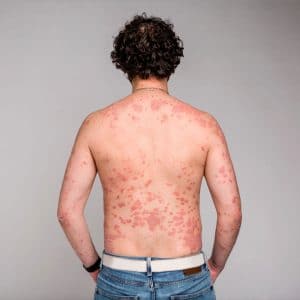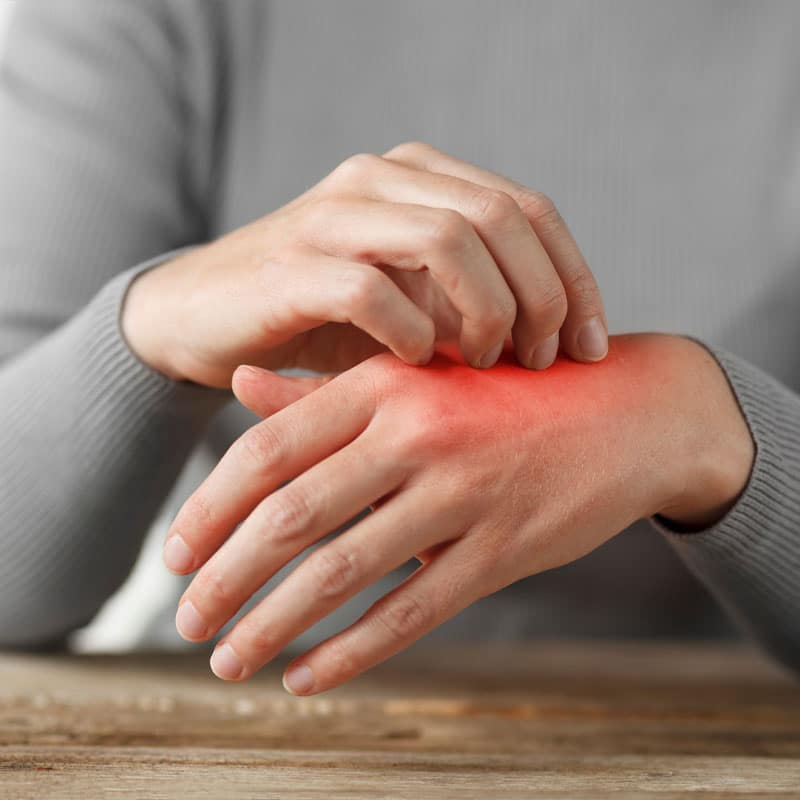Did you know that many skin conditions can be improved with a whole foods diet? Skin is the largest organ of the body and acts like armor of protection from harmful microbes and substances. Because it is the largest organ by land mass, it reacts to what is going on inside the body. The skin is the body’s external mirror of how healthy the body is on the inside. Some of the common skin issues that plague people are eczema, dull skin, acne, wrinkles, Rosacea, and dry skin. Below we look into the best foods for healthy skin along with the foods that negatively affect your skin.
Inflammatory Foods To Avoid For Glowing Skin
The body digests different foods differently. For example, refined flour and refined sugar are stripped of slow digesting fiber, which causes the body to break down these substances quickly, resulting in insulin spikes that cause a pro-inflammatory response. Increased insulin causes increased androgenic hormone response. During an androgenic hormone response pores in the skin start to increase oil production. This oil can become trapped in your pores, resulting in pimples.

Inflammatory foods negatively impact your skin by leading to hormone changes and a slowed digestive tract. Examples of these foods include-
- Refined Sugars
- Refined Flour or Starches
- Gluten
- Coffee
- Alcohol
Examining how these foods impact skin will provide significant evidence to avoid them.
Sugar
Reducing consumption of sugar is the first step towards a healthier body, including skin. According to the American Heart Association, adults should consume no more than 9.5 teaspoons of sugar each day. Unfortunately, most American adults consume 22 teaspoons of sugar, which equates to three pounds of sugar a week.
There are two types of sugars – naturally occurring sugars and added sugars. Naturally occurring sugars are found in dairy products and fruits. Added sugars include-
- Brown sugar – light and dark
- Corn sweeteners
- Corn syrups
- Fruit juices and concentrates
- High fructose corn syrups
- Honeys
- Invert sugars
- Malt sugars
- Molasses
- Raw sugars
- Sugars
- Syrups
Reading and understanding nutrition labels can help one to avoid sugars. Any additives ending in “ose” – dextrose, glucose, lactose, fructose, sucrose, and maltose) should be limited or avoided. Refined sugars have been linked to skin irritation and acne. In addition to this, excess sugar can cause aching limbs, depression, diabetes, fatigue, headaches, hypertension, hypoglycemia, nervous tension, obesity, stiffening of the arteries, and violent behaviors.
Carbohydrates
Simple carbohydrate reduction is an important dietary factor for skin health. Carbs like pasta, refined sugar, and white bread increase cortisol levels, which increases skin breakouts. Instead of choosing white bread, opt for whole grain bread or choose veggies over pasta.
Dairy
Dairy could be a source of inflammation for many individuals. Cow’s milk can cause excess sebum production, which can cause clogged pores and acne. Switch from cow’s milk to a non-dairy alternatives such as almond milk, coconut milk, soy milk, or goat’s milk.
Alcohol
Although there are benefits of some alcohol in the form of wine and the resveratrol antioxidant, alcohol takes precedence over all other metabolisms in the body. Red wine’s resveratrol helps remove free radicals from the body; however, because wine is basically fermented sugars, it can cause numerous skin problems when consumed in excess. Beer is even worse than wine because it is loaded with sugars and salts, which causes dehydration and places stress on the liver. Finally, hard liquors have additives and are corrosive to the body.
Coffee
Coffee, caffeinated beverages, and tea are not suggested for the skin and the body. When caffeine is metabolized, it acts like a diuretic which causes dehydration. Dehydration causes dry skin, which leads to premature aging and wrinkles. Coffee, when consumed in large quantities, also stresses the liver, which can cause a plethora of skin issues.
Best Foods For Healthy Skin
Now that we have discussed what foods you should avoid; it is time to determine the best foods for your skin. The following foods can help improve the health and the look of your skin.
Chocolate
High quality dark chocolate is actually very beneficial. This does not mean typical candy bar dark chocolate, semisweet, milk chocolate, or white chocolate. Cocoa contains antioxidants that help improve circulation and hydration, which enhances skin elasticity and reduces the risk of wrinkles. Aim for 75% dark cocoa chocolate added to recipes or on its own.
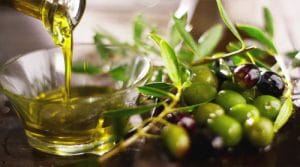
Olive Oil
Olive oil is comprised of antioxidants and monounsaturated fatty acids which help keep skin cells healthy. Studies have shown that consuming 2 teaspoons of olive oil each day can reduce the signs of aging by 31 percent.
Tomatoes
Tomatoes have high quantities of an antioxidant called lycopene. Lycopene improves skin’s natural SPF and can help prevent sunburn and the effects of sun exposure on the skin. Interestingly, eating tomatoes can provide up to 33 percent more protection against sunburn as the lycopene metabolizes in the skin.
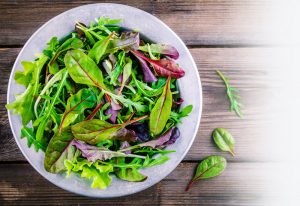
Green Tea
Green tea increases skin’s elasticity and reduces the amount of damage to the skin when it is exposed to sunlight. Drinking green tea daily for twelve weeks will improve skin health. Freshly brewed green tea is ideal since packaged green tea often is packed with excess sugar.
Greens
Dark leafy greens, including spinach and kale, can protect the skin from early aging. These green vegetables contain lutein and zeaxanthin, which help block free radicals that are created by UV exposure. If there is difficulty consuming greens within the diet, one can add liquid chlorophyll or greens powder to drinks. Liquid chlorophyll enhances the immune system and reduces inflammation in the body.
Avocados
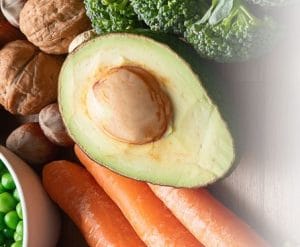
Avocados are high in omega three fatty acids that help create supple skin. These amazing fruits are also filled with vitamin E and vitamin C. Vitamin E helps protect against oxidative damage caused by free radicals. Vitamin C is used in the production of collagen and helps keep your skin smooth and hydrated.
Benefits Of Nutrients For Skin Health
Taking certain nutrients or eating foods rich in specific nutrients offers highly specialized benefits for skin health.
Vitamin C
Vitamin C rich foods like broccoli, citrus fruits, red peppers, and strawberries provide numerous skin benefits, including the prevention of wrinkles and the support of the production of collagen. Vitamin C can help improve skin texture.
Beta Carotene
Do you dream of a dewy complexion? Antioxidant rich foods can help obtain this look. Beta carotene is found in orange, red, and dark green vegetables. Incorporate squash, spinach, sweet potato, and kale into your diet to improve your skin.
Zinc
Zinc gives your skin a healthy glow. Zinc is found in lean meats, poultry, oysters, and pork. It is used in cellular creation and cell sloughing, which gives your skin a bright, healthy glow.

Hydration Is Essential For Healthy Skin
Drinking enough water each day is the best way to keep your skin looking great. Water helps to detoxify the body and flush them out. Drinking plenty of water keeps your skin healthy and clear. Most people need to consume half their body weight in ounces of water daily. For example, if one weighs 140 pounds, it is recommended to drink 70 ounces of pure alkaline water daily.
Because your skin is the largest organ, it often reflects what is going on in your body. Our integrative medicine practitioners recommend eating a healthy diet, taking skin boosting supplements, and avoiding inflammatory foods. In addition to this, get seven to nine hours of sleep each day along with ample amount of exercise to improve skin health.




















